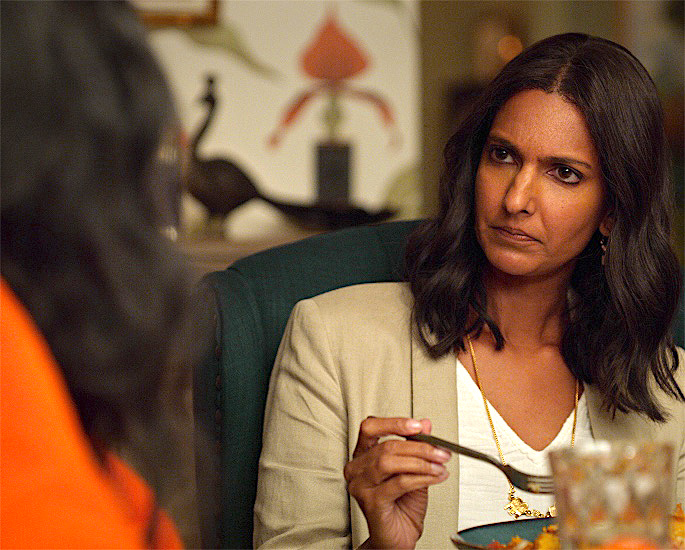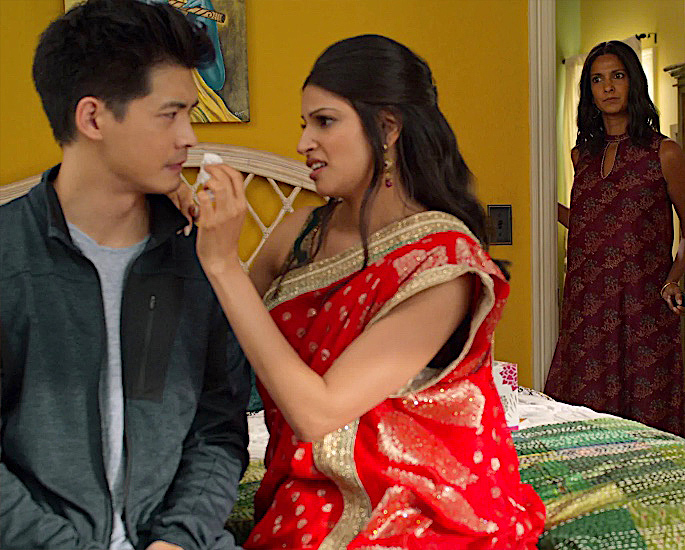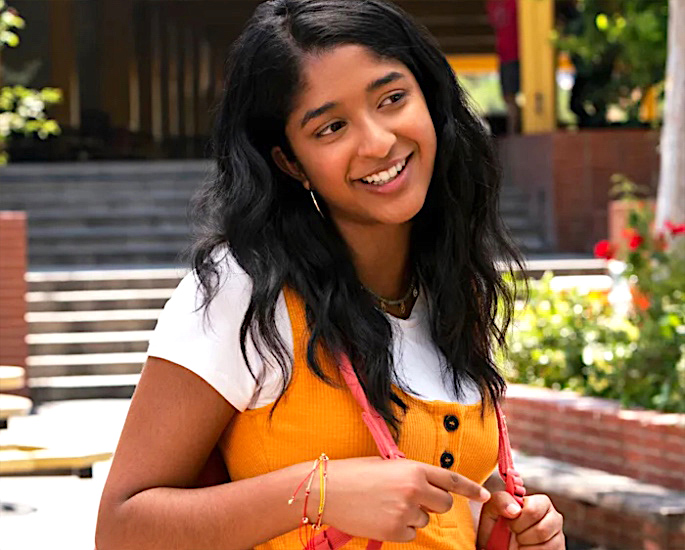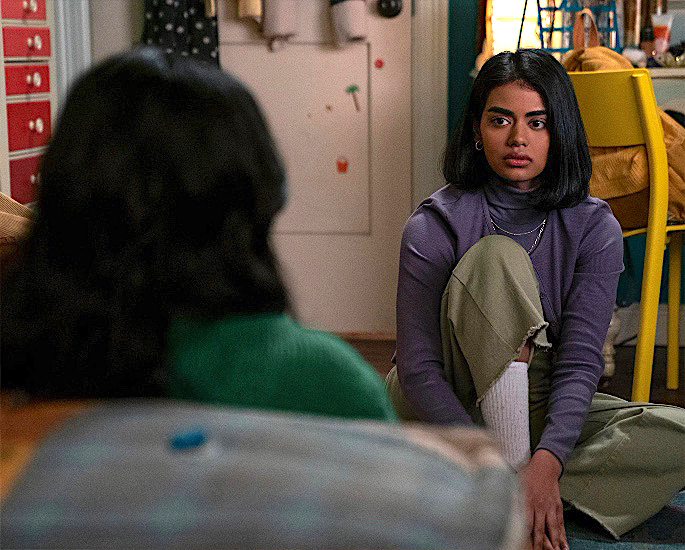“She showed that you can be rebellious"
Never Have I Ever is a popular Netflix Original amongst viewers, especially with its portrayal ofSouth Asians.
The comedy-drama follows a first-generation Indian American, Devi Viswakumar (Maitreyi Ramakrishnan) as she navigates the challenges of high school.
Rated over 90% on Rotten Tomatoes, Never Have I Ever had made an instant impression.
Never Have I Ever was a surprising realisation for many South Asians. They had never seen a teen drama on Netflix revolve around a South Asian character.
For first-generation viewers, the show also became one that many longed for in their youths. Devi projects the relatability of balancing culture and trying to fit norms.
In addition, the show did not steer away from topics that may be uncomfortable to talk about within South Asian communities.
The characters in this show do not shy from the truth, with a vast range of internal struggles and problems, from relationships to mental health.
With the bravery to address such issues, we highly 6 powerful South Asian portrayals from the series.
Single Mother and Work Balance

Being the mother of a teenage daughter already poses some challenges. But Dr Nalini Vishwakumar (Poorna Jagannathan), the mother of Devi, tries to restore balance to her household amid personal problems.
Devi buries her grief, whilst Nalini attempts to manage her own grief, following the death of her husband.
In the series, Nalini is at the top of her game as a dermatologist. However, being a widow, single mother, and a full-time worker can also raise some level of concern within South Asian households.
Traditionally, in South Asian communities, the importance of motherhood can overpower the need for a career. It is pretty evident that this balance is not a walk in the park for the character either.
Nalini requires to raise her daughter in a country that is different from the environment she was growing up in.
Ranee Lactao, a student from the West Midlands, reflects on the balancing act of the character:
“[Nalini] is a progressive character because she is very traditional and she is a parent in a country that doesn’t follow the same viewpoints as her.
“She mixes her own tradition and parental instincts to guide Devi through the world.”
She went on to appreciate the relationship between Nalini and Devi:
“The bond between Devi and her mom is relatable to people-of-colour teenagers.”
Though, Nalini maintains a head-strong outlook throughout the series. She remains a working woman who raises her teenage daughter.
Whilst Nalini does portray a strict attitude towards Devi on multiple occasions, the audience cannot help but sympathise with her.
Defying the pressure of relatives in India, she continues to uphold this work-life balance exceptionally throughout the two seasons.
Therefore, many watchers commonly describe her as a “favourite character” f the show.
Additionally, Nalini seems to effortlessly fill our desires for a strong single mother in Never Have I Ever.
Kamala Nandiwadal: Subverting the Perfect Notion

Kamala Nandiwadal (Richa Moorjani) is a cousin of Devi who is completing her studies as a biologist at CalTech. Born and raised in India, Kamala presents the ideals of a perfect Indian woman.
Working towards a PhD in a biological field, Devi expresses some understandable hatred and envy towards her cousin.
Nalini tells Devi to “learn a little bit from Kamala.” In doing so, the audience develops an interest in whether this “so Indian” character dubbed by Devi can uphold their reputation.
However, to Devi’s surprise, Kamala has imperfections as well. She does not conform to every standard Devi was expecting from her.
Pictured as having a secret boyfriend, Steve (Eddie Lieu), Kamala’s image of perfection to Devi is tarnished.
This humanises Kamala for Devi. We learn that Kamala is not an untouchable and flawless girl anymore. She has her own way of rebelling against expectations.
Rima Patel, a viewer of Never Have I Ever, comments about Kamala not being the usual compliant house lady:
“[Kamala] defied the stereotypes of the Indian submissive housewife.”
She also praises the development of Kamala’s storyline:
“She showed that you can be rebellious, but not in a teenage way, but in a mature, non-conforming way.”
It was meaningful for Never Have I Ever to exhibit how Kamala was just as flawed as the other characters. The plot forces the audience in season one to realise that perfection is practically impossible.
The Confident Teenager

Many fans of the show describe Devi as unlikeable in both seasons. For a protagonist, the character seems to stir up some mass disagreement from the audience at times.
While we hope for Devi to redeem herself, there are opportunities for the audience to lose hope in her.
From inconsiderate behaviour towards Nalini to initiating rumours about her friends, Devi makes some questionable decisions.
However, many will argue that the behaviour of Devi is actually a mechanism for positive South Asian portrayals.
Devi’s pattern of making mistakes and trying to fix them makes her a positive portrayal.
Devi is allowed, time and time again, to make mistakes. Whether they are small or big mistakes, Devi acts like a teenager who simply gets stuff wrong.
Her mistakes heighten the sense that she is just a teenager that should not be defined by racial stereotypes.
For many South Asians, it was refreshing to see a character who refrains from caring about the stereotypes she breaks when making errors.
South Asian girls countlessly face a stereotypical depiction of being timid, obedient and compliant to their parents. Devi does not conform to these standards.
Charis De La Rey, a student from Birmingham, voices her opinion on the character of Devi:
“The way [Devi] acts directly, subverts misconceptions people have about South Asian women.”
This allows her to symbolise a solid aspect of South Asian portrayal in Never Have I Ever.
Aneesa Qureshi and her Eating Disorder

Aneesa Qureshi (Megan Suri) is labelled as Devi’s “Indian Frenemy” by the season two episode, where we first meet the cool Indian student.
Devi is immediately threatened by the instantaneous popularity, which Aneesa seems to radiate.
Aneesa becomes very close with Devi’s ex-boyfriend. As a result, Devi spirals into a harsh feeling of resentment towards Aneesa.
This hatred results in Devi callously spreading a rumour about Aneesa being anorexic, which ends up being true.
The inclusion of discussions around eating disorders in Never Have I Ever holds relevance.
Eating disorders are often stigmatised within South Asian households, partially because many people are uneducated about them.
Many people in South Asian communities do not realise the significant risks of eating disorders. That is why Aneesa’s story strikes a chord for many.
Aneesa’s mother, Noor, is a big supporter, ensuring that her daughter is in a beneficial environment when handling her disorder.
The normalisation of talking about eating disorders amongst South Asians was positively represented.
Nalini decides against a move back to India

After season one, Nalini plans to move back to India, so that Devi can grow up in a disciplined environment.
We can also assume that the widow wants to be close to the comfort of her own family.
However, Nalini’s initial arrival in India attracts a lack of enthusiasm. Her mother abandons plans to go condo-hunting for a wedding.
She even comments to her daughter that she values “her social life” more.
Furthermore, Nalini’s mother disapproves of her hope to re-establish her medical practice. She calls for her daughter to be a “little less aspirational.”
This is a pivotal moment in the show. The audience realises that India and Nalini’s career aspirations do not correlate.
Also, the support system Nalini was hoping for in India is no longer existent.
By deciding to revoke the option of moving back to India, Nalini manages to take control back into her hands. She enjoys working despite her losses. So, India proves not to be the right fit.
Devi’s Journey Therapy

Returning to our protagonist, Devi is portrayed as one of the most meaningful representations in Never Have I Ever.
Devi’s therapy journey is by no means a smooth one. We see Devi retreat to Dr Jamie Ryan, her therapist, throughout the series.
The constant recurrence of Devi’s therapy sessions standardises the setting for all of the series.
The stigma attached to mental health issues has been one, which has remained prevalent within the South Asian diaspora.
Even Nalini expresses her opinion that therapy “is for white people” in season one.
However, we see Nalini succumb to the gentle advice of Dr Ryan in the finale. This explores the theory that everybody has to eventually face their grief to progress over it.
Never Have I Ever is by no means a faultless show.
But many have come to praise its representation. A Guardian review labels it as “a step in the right direction” in this respect.
Though, others claim that the writing and overall plot of the show are not so great.
Whilst Devi provides us with some unwavering confidence, the popular disapproval of the protagonist and her decisions can overshadow her positive portrayals.
Nevertheless, it is undeniable that Netflix was able to provide us with a cast that South Asians could get behind.
The unapologetic courage displayed by the Indian characters in the series was truly captivating.






























































